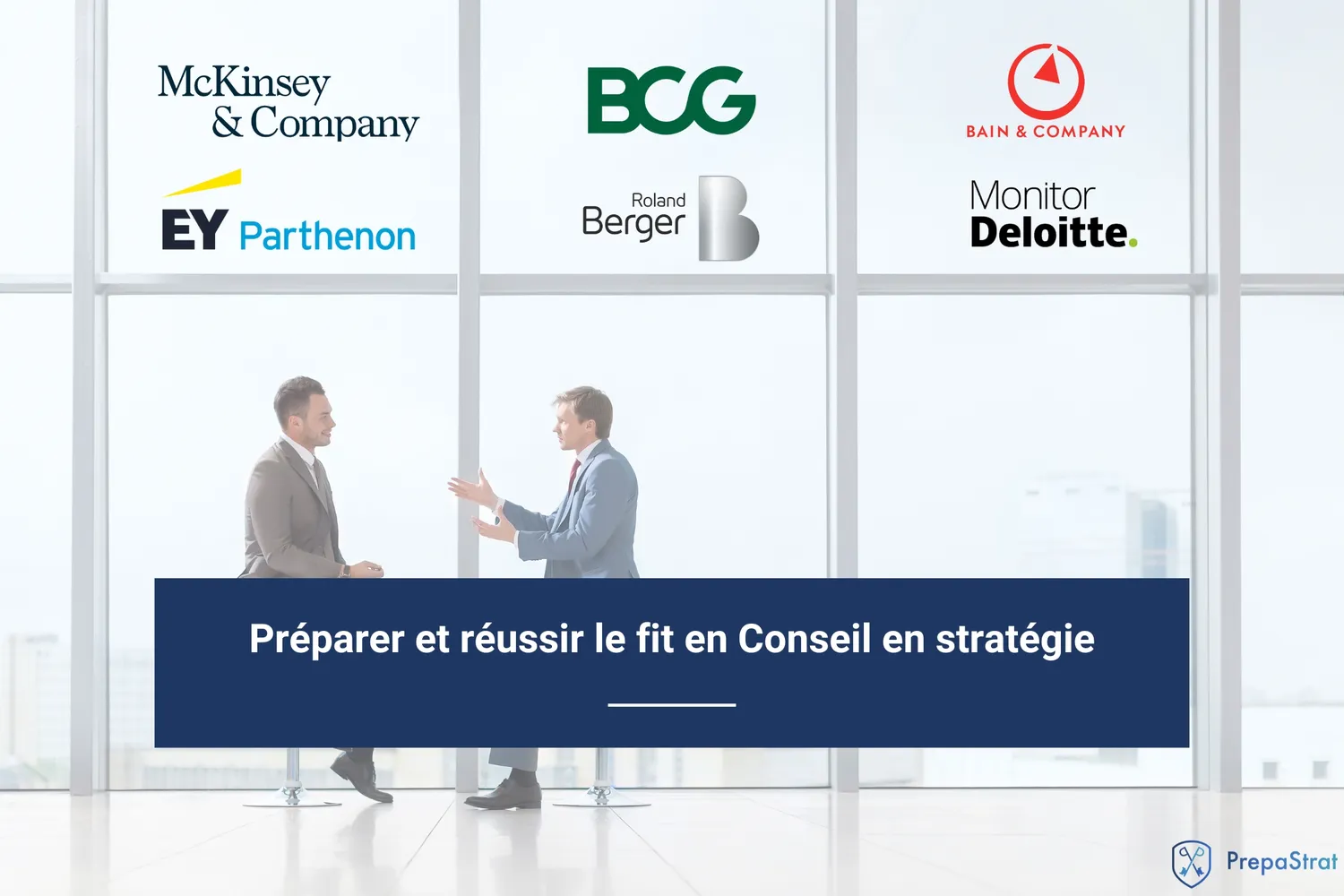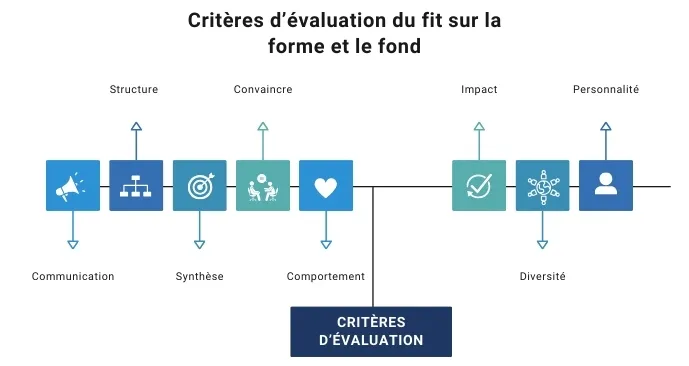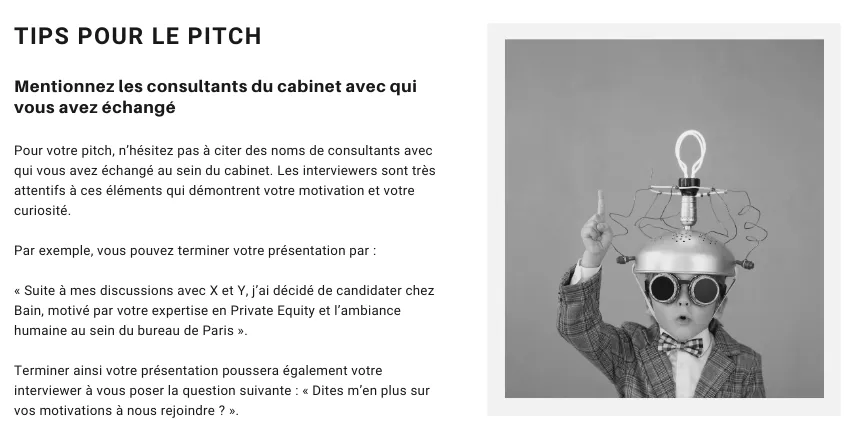
The rule is simple: with a poor fit, no matter how good you are on the case study, you won't pass. An excellent fit won't save you if you totally fail the case study, but it can save you if you haven't particularly shone. In the final round, fit is even more important - it's what gets you an offer over the other candidates. So don't make the mistake that most candidates do: don't underestimate the importance of preparing the fit.
If you want to be among the 1% of candidates who join a strategy consulting firm, you definitely need to prepare and succeed in your fit. This article is for you.
What is a fit in strategy consulting?
The " fit" part: the key to winning a bid from the best firms
The fit part of the interview plays a decisive role in the recruitment process of strategy consulting firms. It generally takes place at the beginning of the interview and lasts an average of 15 minutes, to which you can add the 5-minute Q&A at the end. The Q&A is the part reserved for questions from the candidate at the end of the interview.
The fit allows the candidate to introduce themselves, share their past experiences, show their personality and express their motivation to join the firm as a strategy consultant. The most important element of the interview and of your recruitment process, the fit is what will enable you to pass rounds, differentiate yourself from other candidates and get an offer.
The fit section should enable interviewers to answer three fundamental questions:
- Skills: Is this person right for strategy consulting?
- Motivation: Is this person right for my practice?
- Personality: And finally, do I want to work with this person?
You need to link each of your answers to the fit questions to your skills, motivation and personality. In this way, the interviewer will be convinced by the end of the interview that you're the right person for strategy consulting at his firm, and that he wants to work with you.
Fit is assessed on both form and content. Keep in mind that interviewers aren't just looking for smart people. During your interview, they're choosing their future colleague, so they want nice people with whom they can see themselves spending time. Through the fit, you need to be able to present your experiences and show who you really are. Your answers should enlighten the interviewer as to your ability to become a good consultant, your motivation to do this job and, above all, to join this firm. Last but not least, he must be convinced that working with you will be a pleasure.

Form assessment: learn to communicate like consultants
In terms of form, interviewers will be very demanding, and you'll make the difference by demonstrating your oral fluency and your ability to share your ideas clearly. The main evaluation criteria are as follows:
- Communication :
- Clear, concise communication.
- Ability to adapt your speech.
- Convincing :
- Professional persuasion skills.
- Use solid arguments to support your ideas.
- Ability to Synthesize :
- Ability to effectively summarize essential information.
- Avoid superfluous details and focus on the essentials.
- Ability to Structure :
- Clear, structured organization of ideas.
- Avoid getting bogged down in details and keep the narrative concise.
- Behavior :
- Dynamic, energetic presentation.
- Maintain a professional, smiling and well-groomed appearance.
Substantive evaluation: share your best experiences
Interviewers will also pay close attention to what you have to say. Your fit should serve to prove that you have the skills and qualities required to be a good consultant, and it's your experience that will enable you to put this forward.
- Impact of your experiences :
- Significant responsibilities with other individuals.
- Impact and results of your experiments.
- Diversity of experience :
- Ability to adapt to different contexts and environments.
- Ability to work with people who are different from you.
- Personality:
- Interests outside your professional and personal experience.
- Involvement in associations.
- Practice of a sport, art or other commitment.
The last part about your personality is probably the most important of all. This part can set you apart from the other candidates, because it's yours alone, and it's surely what the interviewer will take away from your interview at the end of the day.
Now that we've seen what it's like to fit in a strategy consulting interview, let's take a look at how to prepare effectively.
Read also: 10 things you need to know before applying for a job, says a candidate
Step 1: Write your life story
One of the most effective approaches to preparing for the fit part is to draw up a detailed chronology of your life. This personal chronicle should include elements such as your academic background, exchange experiences, internships, and even personal aspects such as sports, associative activities, volunteering, and your passions. You should list all your professional, personal and academic experiences. For each period, it's essential to think about several aspects:
- What you've done
- The reasons that led you to make these decisions
- Outstanding experiences, highlighting powerful anecdotes and challenges overcome
- What each experience has given you, both personally (development of qualities and skills) and on a human level (encounters and social intelligence).
You can use your CV as a starting point for the list of experiences you're going to detail. The idea is for you to be able to discuss in depth and detail all the experiences on your CV that your interviewer is likely to challenge you on.
Once you've completed this exercise, you should be able to present your experiences in 2 minutes, with the following structure: description of the experience and what you did there, what you learned and what will help you in Strategy Consulting. At the end, you can offer to share a particular project you carried out during this experience.
Now that you've mastered all your experiences, you can start preparing your answers to the classic strategy consulting interview questions: introduce yourself (the pitch), why strategy consulting, why this particular firm.
Step 2: The strategy consulting pitch
The first impression is the most important and the one that stays with you throughout the interview. And that first impression is the pitch. The pitch is your presentation at the beginning of the interview. The aim of the pitch is to quickly understand who you are and what you do here. What you're doing here means why you've applied for a position as a strategy consultant with this firm.
The pitch can be built in two ways: thematic or chronological.
- The thematic approach can be very relevant and can help your presentation to highlight three main ideas. For example:
- Structure by theme: academic experience, professional experience, personal experience
- While the chronological approach may be easier to follow, it sometimes lacks relevance. For example:
- Chronological structure: from your post-baccalaureate studies to the present day
The pitch should last a maximum of 2 minutes, and this rule should be the same for every answer you give. After 2 minutes, your interviewer will have lost you. Make several versions and test them. Your pitch won't be created in a day, and it's normal to come back to it several times.
By the end of the pitch, your interviewer should be convinced that strategy consulting, and working for his or her own firm, is the next logical step in your career.

See also : How to join a strategy consulting firm
Step 3: Why our firm? Be specific!
The question "Why our firm?" can be asked directly or indirectly. In either case, it's important to be prepared. To answer this question, you need to prepare 2 or 3 arguments, and above all vary the type of argument. In general, you'll have two main types of argument: professional and personal.
Professional arguments are linked to the firm's missions: sector expertise, functional expertise, mission typology, clients, etc. Generally speaking, for this type of argument, you need to link it to one of your past professional or academic experiences. For example:
- Join Bain for Private Equity
- Professional experience: "I wanted to join Bain because of its expertise in Private Equity and the possibility of doing six months of Ring Fence, working exclusively in this field. I've been interested in private equity since my internship at Goldman Sachs, where I had the opportunity to work with several investment funds.
- Academic experience: "During my master's degree at ESSEC, I specialized in investment fund strategy and wrote my dissertation on the subject: La stratégie de diversification des fonds d'investissement pour diminuer le risque économique et financier. The knowledge I have developed on these subjects has motivated me to join Bain, recognized for its expertise in private equity.
More personal arguments are generally linked to your interests, your involvement in associations or simply to subjects that touch you. You can, of course, illustrate these arguments with academic or professional experience. The key is to remain relevant and coherent in your arguments.
- Join Bain for its respect for work-life balance
- "I'm a huge soccer fan and I still play 1 or 2 times a week. Being a consultant is a demanding job and I know I won't be able to play as many sports as I used to. But I also know that Bain is very concerned about the work-life balance of its consultants. Thanks to the night-off system, I'll still be able to play soccer once a week, unless there's an emergency, of course :) ".
To select the right arguments, it's essential to talk to one of our consultants. This will provide you with arguments that cannot be found on the Internet with just two clicks of the mouse. For example, everyone knows that Bain is renowned for its expertise in private equity. Unlike the night-off argument, which is much more precise and difficult to know without being in the firm. What's more, once again, mentioning the names of consultants is solid proof of your motivation and curiosity.
See also : Strategy consulting firms
Step 4: Why strategy consulting? Use personal arguments!
The question "Why strategy consulting?" is less likely to come up in an interview, especially if your pitch is clear or your answers to other questions help us understand what motivates you to do this job. It's also more likely to come up if you have similar experience to strategy consulting, for example in another type of consulting: management, operational, organizational, etc. Another frequent case is when you have internships in prestigious sectors that are difficult to access, such as M&A and Private Equity. Indeed, the interviewer may wonder what prompted you to change sectors after having obtained internships and experience in these highly selective professions. Whatever the reason, always be prepared to ask this question.
As with other fit and motivation questions, you need to have 2-3 arguments linked to your past experiences. Professional experience is generally the most relevant for this question, but more personal experience also works. The most important thing is that your arguments are personal and not generic.
Finally, if strategy consulting is close to your previous experience, or if you think you could be challenged on it, prepare an answer highlighting the main differences between the two professions, while emphasizing your willingness to do strategy consulting. For example, to the question "Why strategy consulting and not M&A?" You need to focus on your arguments in favor of strategy consulting.
Read also: Top 5 reasons to join strategy consulting?
Step 5: Train your fit to the max
Fit is the most important element of your strategy consulting interviews, so practice! It's essential. The advantage of fit is that you can practice it alone, in pairs or with others. In the same way that you practice case studies, you can also practice fit over 20 minutes. You can also incorporate one or two fit questions before each case study workout to vary the fun.
To practice properly, start by making your pitch and then your interviewer will ask you questions. If you wish, you can practice on a particular firm, but it's not necessarily necessary. The interviewer will need to evaluate you on both form and content.
- Form, as mentioned above, comes into play at several levels of your answers.
- Voice: clarity, flow, elocution, pauses
- Body: smile, dynamism, body language
- Speech: structure, synthesis, formulation and turns of phrase, duration, language tics
- The background must be impeccable to convey the right messages to your interviewer.
- Relevance of the story to the question posed and the ideas to be shared
- Story coherence: be careful if you embellish your stories - and there's nothing wrong with that - but you need to make sure they retain their coherence.
- Impact and results: paramount in all your experiences, consultants place a great deal of importance on the impact and concrete results of your stories.
Fit sessions with other people will help you improve both form and content. You can also practice on your own by recording yourself. This exercise is very useful for correcting the form of your speech and paying attention to the length of your answers. Once again, an answer lasting more than 2 minutes is too long. It's better to have short, concise answers on which your interviewer will challenge you by expanding on certain points, than long answers that will lose everyone.
Bonus: Q&A for the best last impression
Q&A is often overlooked in fit preparation, although here too you need to be prepared. Unlike the other questions, Q&A requires preparation only the day before the interview. There's no need to practice for this part either.
The first tip is to banish all questions with obvious answers that you can find in 2 minutes on the Internet or on the firm's website. Many candidates unfortunately fall into this trap. Remember that the consultants interviewing you are taking time out of their busy day. They'd hate to waste that time for nothing.
The second tip is to succeed in establishing a dialogue and bond with the interviewer, just as you should with your colleagues and customers. To do this, you need to:
- Take note of your interviewer's presentation at the beginning of the interview.
- Ask personal questions about your missions, career choices, specialization, interests, etc.
- Bounce back on the answers he gives you, making a link with you if you can.
The third tip is to find out about your interviewer beforehand. Normally, you'll get the name of your interviewer the day before. Take the opportunity to look at his or her LinkedIn and see if there's any information on the Internet about him or her. This will enable you to prepare a few questions and identify common points of interest. For example, you could ask a question like :
- "You mentioned in your presentation that you specialized in the aviation industry. Before the interview, I saw on Linkedin that you had shared the latest GIFAS report on sustainable aviation fuels. I myself did an internship in this sector and I find these subjects fascinating. Do you work with certain customers on environmental issues and innovation around the fuels of the future to decarbonize aviation?"
The idea is for it to be a real exchange, a discussion or even a debate, not just your questions and their answers. It's the end of the interview, so you have to give it your all to leave the best last impression.
See also: All you need to know about strategy consulting
Your fit will make you the most formidable of candidates
Thanks to your fit, you'll get several offers from the best practices. The better your fit, the more you've practiced, the more natural you'll look. The fit is the most important element of your interviews, the one that will help you get an offer from the best firms. The interviewer opposite is recruiting his future colleagues. He needs to feel that he's ready to spend weeks with you, working on a complex subject for a difficult client. Be yourself during the fit, show authenticity and relax. Again, with the right preparation and training, you'll be able to master the whole fit part without any problems.
Do you want to become an unbeatable fit for the best strategy consulting firms?
Then join us and be part of the 90% of our candidates who integrate a TOP 6 every year. Prépa Strat is the No. 1 interview preparation program for strategy consulting firms, with :
- 4 years of expertise, we're the oldest player in strategy consulting interview preparation
- 5 bootcamps per year with 35 hours of training over 5 days
- 1 coach from an MBB for each supported candidate
- 6 online training modules to prepare you for interviews and understand what Strategy Consulting is all about
- 50+ corrected case studies that have already been published by top strategy consulting firms
Aim for excellence and join the top strategy consulting firms with Prépa Strat
Discover our bootcampour on-the-job interviews and our e-learning platform !